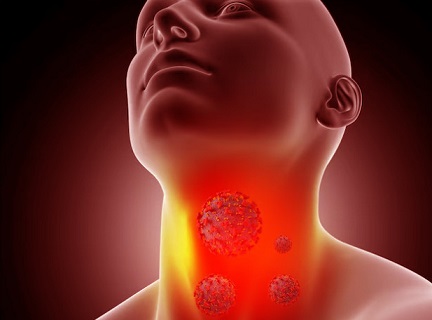Nikhil Prasad Fact checked by:Thailand Medical News Team Oct 13, 2024 6 months, 1 week, 1 day, 14 hours ago
Medical News: COVID-19 has impacted many aspects of human health beyond the typical respiratory symptoms. Emerging research highlights how the virus, specifically through cytokine storms, can severely affect the thyroid gland, causing various dysfunctions. This
Medical News dives into the connection between COVID-19 and thyroid disorders, shedding light on how the immune system's hyperactive response may lead to thyroid complications.
 New insights into thyroid dysfunction triggered by COVID-19's cytokine storm
New insights into thyroid dysfunction triggered by COVID-19's cytokine storm
A cytokine storm occurs when the immune system releases excessive levels of inflammatory cytokines, which can lead to severe complications, including thyroid issues. Researchers from institutions including Universiti Sains Malaysia, King Faisal University in Saudi Arabia, Kafrelsheikh University in Egypt, University of Bahri in Sudan, University of Khartoum in Sudan, and Sunway University in Malaysia contributed to this work.
Understanding Cytokine Storms and Their Role in Thyroid Dysfunction
A cytokine storm is a life-threatening condition in which the body releases a large number of inflammatory proteins called cytokines. These cytokines can damage tissues and organs by promoting excessive inflammation. In COVID-19 patients, cytokine storms have been linked to severe respiratory distress, organ failure, and even death. However, they also affect other organs, including the thyroid.
Researchers have found that COVID-19 patients can experience thyroid complications such as subacute thyroiditis, autoimmune thyroiditis, and abnormal thyroid function. The virus's entry into thyroid follicular cells, facilitated by angiotensin-converting enzyme 2 (ACE2) receptors, leads to direct damage to the gland. In addition to this direct effect, cytokine storms release inflammatory cytokines like IL-6, IL-1β, and TNF-α, which cause further disruption in thyroid function.
How COVID-19 Leads to Thyroid Disorders
COVID-19 can cause a range of thyroid issues, even in patients with no previous thyroid conditions. The virus’s spike protein binds to ACE2 receptors on thyroid cells, allowing the virus to invade and damage the thyroid gland. This damage is often compounded by the inflammatory cytokines produced during the immune response.
The study found that COVID-19 patients are at risk of developing non-thyroidal illness syndrome (NTIS), thyrotoxicosis, and even autoimmune thyroid disorders. NTIS, also known as euthyroid sick syndrome, is characterized by abnormal thyroid hormone levels without intrinsic thyroid disease. Thyrotoxicosis, on the other hand, is a condition where there is an excess of thyroid hormones in the body. Autoimmune disorders like Hashimoto’s thyroiditis and Graves’ disease may also emerge or worsen after a COVID-19 infection.
The Connection Between Inflammatory Pathways and Thyroid Damage
Cytokine storms activate various signaling pathways that lead to thyroid dysfunction. For inst
ance, interleukin-6 (IL-6), a key player in the cytokine storm, upregulates pathways such as the Janus kinase/signal transducer and activator of transcription (JAK/STAT) and nuclear factor-kappa B (NF-κB) pathways. These pathways, in turn, promote inflammation and damage thyroid cells.
The researchers noted that COVID-19 patients with higher levels of IL-6 were more likely to experience thyroid complications. IL-6 not only reduces the production of thyroid-stimulating hormone (TSH), a critical hormone for regulating thyroid function, but also increases the production of reverse T3, an inactive form of the thyroid hormone T3. This combination disrupts the balance of thyroid hormones in the body, leading to symptoms such as lethargy, muscle aches, and neck pain.
Treatment and Management of Cytokine Storm-Induced Thyroid Dysfunction
While COVID-19-associated thyroid dysfunction is a concerning issue, the study offers hope in terms of potential treatment options. Corticosteroids such as dexamethasone have been shown to reduce the severity of cytokine storms by dampening the immune response. Other treatments, including JAK inhibitors like baricitinib and nucleotide analogues like remdesivir, also show promise in preventing or managing thyroid complications in COVID-19 patients.
N-acetyl-cysteine (NAC), an antioxidant with anti-inflammatory properties, has been studied for its potential to help mitigate thyroid damage caused by oxidative stress during cytokine storms. By reducing the oxidative burden on thyroid cells, NAC may help preserve thyroid function and prevent further damage.
Conclusions
The study highlights the significant impact of cytokine storms on thyroid function in COVID-19 patients. The virus not only invades the thyroid gland directly but also triggers inflammatory processes that exacerbate thyroid dysfunction. The research shows that COVID-19 patients are at risk of developing conditions like NTIS, thyrotoxicosis, and autoimmune thyroid disorders due to these inflammatory processes.
However, there are promising treatment options on the horizon. Corticosteroids, JAK inhibitors, and antioxidants like NAC could play a key role in managing thyroid dysfunction in COVID-19 patients. As we continue to learn more about the long-term effects of COVID-19, understanding how to prevent and treat these thyroid complications will be critical for improving patient outcomes.
The study findings were published in the peer-reviewed journal: Drug Design, Development and Therapy.
https://www.dovepress.com/cytokine-storm-induced-thyroid-dysfunction-in-covid-19-insights-into-p-peer-reviewed-fulltext-article-DDDT
For the latest COVID-19 News, keep on logging to Thailand
Medical News.
Read Also:
https://www.thailandmedical.news/news/viral-infections-including-covid-19-and-thyroid-cancer-a-new-threat-emerges
https://www.thailandmedical.news/news/covid-19-news-doctors-from-west-virginia-warn-that-sars-cov-2-infections-can-lead-to-thyroid-storms
